By Ana Rodriguez Soto - The Archdiocese of Miami
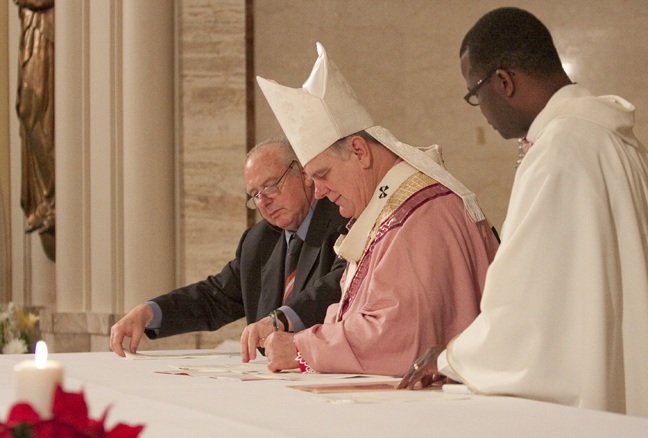
Photographer: ANA RODRIGUEZ-SOTO | FC
Archbishop Thomas Wenski signs the papers erecting Redemptoris Mater seminary. At left is Adelchi Chinaglia, canonist for the Neocatechumenal Way, and at right is Father Chanel Jeanty, archdiocesan chancellor for canonical affairs.
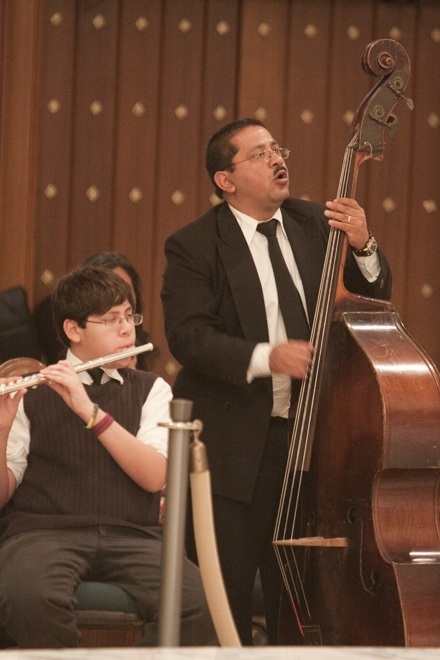
Photographer: ANA RODRIGUEZ-SOTO | FC
Members of the Neocatechumenal communities in South Florida provide the music for the Mass.
Redemptoris Mater (Mother of Our Redeemer) will open in January with 12 seminarians � three from the U.S., including one from Miami, and nine from other countries around the world.
The seminary is the seventh redemptoris mater missionary seminary in the U.S., and the 86th around the world, opened with the help of the Neocatechumenal Way, �an instrument for evangelization� founded in Spain in 1964 by two lay people � Kiko Arg�ello and Carmen Hernandez � and officially recognized by the Holy See in 2008.
The first Neocatechumenal seminary was founded in Rome in 1987, after Arg�ello proposed the idea to Pope John Paul II, who enthusiastically endorsed it.
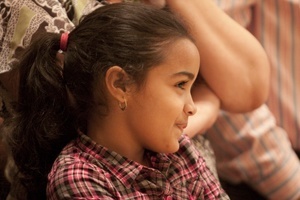
Photographer: ANA RODRIGUEZ-SOTO | FC
Leslie Daniella Rosso, whose family are members of the Neocatechumenal community at Holy Cross Parish in Orlando, listens to the Gospel.
Redemptoris Mater�s seminarians will study alongside other archdiocesan seminarians at both St. John Vianney in Miami and St. Vincent de Paul in Boynton Beach, but receive additional formation following the �itinerary� of the Neocatechumenal Way.
The Neocatechumenate is a series of steps � similar to the RCIA, or Rite of Christian Initiation of Adults but usually lasting much longer � aimed at rekindling the faith in people who have been baptized Catholics.
Gennarini described the Neocatechumenal Way as �an itinerary of Christian initiation to help people, most of whom already have been baptized, to discover what baptism is.�
He said the Neocatechumenate is a way to fulfill John Paul II�s call for a �new evangelization� in today�s increasingly secularized world.

Photographer: ANA RODRIGUEZ-SOTO | FC
Giuseppe Gennarini, who is responsible for the Neocatechumanal Way in the U.S., speaks during the Mass.
He noted that �many young people today have a vocation but don�t come from families where there was a Christian atmosphere.�
He described the Neocatechumenal Way as �a school of faith,� both for seminarians and for families who are nominally or culturally Catholic.
Currently, there are 30 Neocatechumenal communities in eight archdiocesan parishes, some of whose pastors were represented at the Dec. 11 Mass.
One of them is Father Raul Angulo of Mother of Christ in Miami, who has nine Neocatechumenal groups within his parish. He said the groups bring �much life and add a tremendous accent to the liturgy. They are hard workers, very service-oriented and very committed to growing and purifying themselves in holiness.�
�Opening a new seminary is a miracle � given today's lack of vocations,� said Lucia Benigni, who with her husband, Stefano, are responsible for the Neocatechumenal Way in Florida. �These vocations come from families saved by the announcement of the Gospel received through an itinerary of Christian initiation. Out of gratitude these families opened themselves to life."
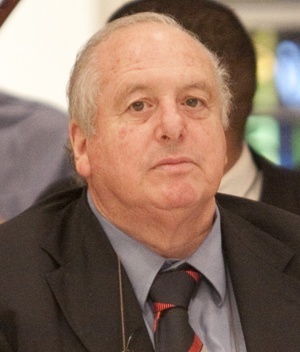
Photographer: ANA RODRIGUEZ-SOTO | FC
Adelchi Chinaglia, canonist for the Neocatechumenal Way worldwide, and a canon law professor in Venice, Italy, takes part in the Mass.
�The evangelization really is the work of the Lord,� Benigni said, pointing out that in 1998 there were only two Neocatechumenal seminaries in the U.S. � one in Denver and one in Newark.
The rector of the new seminary is Father Emanuele De Nigris, a native of Italy and product of the Redemptoris Mater seminary in the Archdiocese of Washington, D.C.
Father De Nigris also has been appointed pastor of St. Cecilia Parish in Hialeah, which was merged with St. John the Apostle in 2009 for financial reasons. The parish will officially re-open Sunday, Dec. 18, with a Mass at 5 p.m. celebrated by Archbishop Wenski.
Father De Nigris pointed out, however, that �St. Cecilia and the seminary are not the same thing.�
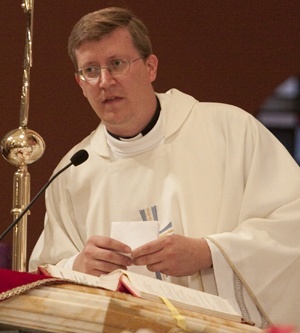
Photographer: ANA RODRIGUEZ-SOTO | FC
Father Emanuele De Nigris, who will serve as rector of the new Redemptoris Mater seminary, speaks during the Mass.
The parish will temporarily serve as the residence for the Redemptoris Mater seminarians, who are currently living in groups of two in homes of Neocatechumenal families.
When ordained, the seminarians will be archdiocesan priests but Archbishop Wenski will be able to send them, as he put it, �to any place in the world to support the new evangelization,� not just within the Archdiocese of Miami.
�These seminaries are international,� said Adelchi Chinaglia, a professor of canon law from Venice, Italy, who serves as canonist for the Neocatechumenal Way and also was present for the signing ceremony in Miami.
He explained that the Neocatechumenal seminary purposely brings together men from all over the world in order to prepare them for their role as missionaries.
�They all learn each other�s languages. They learn to appreciate different cultures,� Chinaglia said. �A seminary is always an immense gift for the diocese.�
As Archbishop Wenski put it during his homily at the Mass, �the Holy See, in approving these missionary seminaries, saw in them a fruit of the Second Vatican Council as well as a response to that same Council�s call for the formation of clergy available to be sent anywhere in the world where they may be needed. Our local Church of Miami has benefited from the presence of many priests who have come here from elsewhere and served with a true missionary spirit � our own experience as an archdiocese explains why this initiative is undertaken today.�
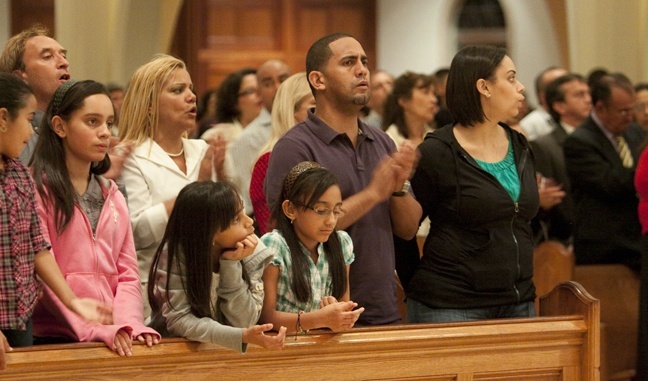
Photographer: ANA RODRIGUEZ-SOTO | FC
The German family, including dad Angel David, mom Elynes, and daughters Pamela, Kayla and Angelica, take part in the Mass. They are members of a Neocatechumenal community in Holy Cross Parish, Orlando.


Comments from readers